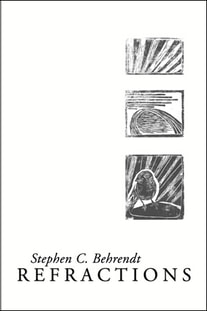The very essence of the word refraction takes its basis from the physical world; referring to when a ray of light is diverted from one path and begins to traverse another. In his new poetry collection, Refractions, Stephen C. Behrendt uses the term as a focal point for his collection to take an alternate look at the morbid aspects of humanity. Behrendt creates a portrait of love, nature, and what it means to be human through an epic scope, looking at life not only through the viewpoint of an animal, but through the viewpoint of his own life. Throughout Refractions, Behrendt uses a prelude and five sections to create a feeling of movement through life and to allow a natural flow. The prelude opens with the quiet and unassuming “My Daughter Dances,” which is Behrendt’s reflection on his adopted Chinese daughter. The author’s juxtaposes with his daughter’s dancing and the cold travel from China is a timely refraction of the light of death - out of the cold world of death came a “living diagonal.” Behrendt's poetic narrative of his daughter serves as foreshadowing for the flow of the anthology, starting off innocent, going into the darkness, and emerging a stronger and becoming a different entity than before.
The opening sections focus on the influence of animals and nature in domestic life. Illustrative and visual descriptions detail of a world where nature breaks through the seams of man made society. In these early sections, the elements of nature are not perturbing, but they are a welcome addition. This can especially be seen in “Filling The Feeders” as the author describes squirrels as “billowing, blowing tails, / to stoke their small fires to warm them / through the cutting wind of darkness.” Behrendt establishes animals as living side by side with humans, attempting to live life to the fullest regardless of the conditions – whether it is an impending snowstorm, the perils of time, or the ever-present threat of death. Despite how dark some of the themes may get, the grounded in nature imagery creates a bright and pleasant tone. As the sections go on, Behrendt focuses his attention on the juxtaposition of humans and both their physical surroundings and the problems arisen by humanity. In contrast to the earlier sections, Behrendt focuses on the feeling of sterilization and conformity. His works are now focused on purely humans and contains very little of the natural world. The imagery is cold and brisk, making the reader feel at unease. Towards the end of the third section, Behrendt begins to bring in details that recall nature and uses imagery to focus on the natural world, as seen in “Seminar: Computers and the Humanities” as he describes a college classroom’s fascination with a fellow classmate’s carrots. The author narrates this action by describing how she “begins slowly to nibble from a bag / of crisp, cool, fragrant carrots.” In an emotionless environment such as a college classroom, Behrendt recalls the type of imagery from works from the earlier sections – based on natural and physical world. The later sections of Refractions begin a steady return to the earlier sections’ use of natural imagery, but his point of view remains grounded in the morbid qualities of human life. He maintains his initial focus on the man-made, but Behrendt grounds the imagery in nature. Such poems entitled “Carolina” and “ASU Plaza” share the focal point of the nature around them through the eyes of the author, but they also feel slightly bitter towards the real world. For instance, as Behrendt describes the Sunday morning silence in “ASU Plaza,” he states that “no one here yet, no cell phones, i-pods, / no sound but water falling, rippling, / trilling down the pool’s stepped sides." Despite the constant barrage of technology and the sterilization of humanity, Behrendt finds small joys in the silence, appreciating how nature is slowly breaking way to the human world. These final works call back to the end of "My Daughter Dances," where beauty and life has arisen from the cold and morbid world. Behrendt’s collection of poetry does not make its impact immediately. As time goes on, the reader begins to recall and ponder their place in nature as the author's stark and contrasting imagery throughout the collection leaves a bittersweet mark on the reader's soul. Images of carrots of calculated classrooms and the quiet walkways of a college campus become ingrained as we ponder the morbid aspects of humanity - death, oppression, and solitude. Regardless of how we feel regarding humanity's place in nature, Refractions reminds us that even though we are in a constant battle for dominance with the natural world, we also live side-by-side. Nature does not have to be a weapon or an antagonist. Nature can just be another side of ourselves.
0 Comments
Leave a Reply. |
Archives
April 2024
Categories
All
|
|
Glassworks is a publication of Rowan University's Master of Arts in Writing 260 Victoria Street • Glassboro, New Jersey 08028 glassworksmagazine@rowan.edu |
All Content on this Site (c) 2024 Glassworks
|


 RSS Feed
RSS Feed
